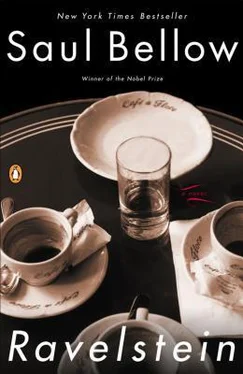"Well, we'll make you a double team of totally bald friends," said Ravelstein. Ravelstein did not reproach me for this but it was clear from his way of putting it that since time was now very short I shouldn't bring him new acquaintances.
"Did you say he was a Catholic priest?"
"Once, he was," I said. "He applied for a release. He's a Catholic still…. You have a Jesuit friend yourself-Trimble."
"Trimble and I shared a flat in Paris and we often went out together. But he was a Davarr student like me and we spoke the same language."
"Well, I haven't discussed this with Sam Pargiter but you can be sure that he comes here because he's read you and you can be sure also that he would never try to pull off a ninth-inning conversion."
I discover, looking back, that I was curiously concerned with the people who came to see Ravelstein in his last days and, along the walls of the room, form the largely silent group of witnesses. He no longer had the strength to accept or reject visitors. Of some of them I could say that he didn't at all want them to be there. One of his long-time rivals, Smith, appeared with a new wife who coached the professor at the bedside, "Say that you love him. Go on-say it." And the man lamely said, "I love you," when it was perfectly plain that he loathed him. They loathed each other. Ravelstein broke through this impossible moment with a golden smile but he was no longer capable of intervening. Clearly Smith was angry with his latest wife. Nobody had the authority to order the Smiths to leave the bedside. So it was just as well that Pargiter, whose presences, as I was dying, I would have welcomed, was sitting by the door. Pargiter came to comfort or witness-very simply, to sit along the walls and do a job, largely tacit, of being there.
Those of whom he had a genuine need came regularly. The Floods, for instance, husband and wife, a couple to whom Ravelstein and Nikki were greatly attached. Flood was part of the university administration-community relations were his special responsibility. He represented the University at City Hall and supervised the campus security system-the university police reported to him. Scandal management was one of his assignments. He was a complex, feeling, earnest, and good-hearted man. God knows how many unpleasant matters he had taken care of for the University community. Nor did you have to belong to that community to be taken up by him. There was a Greek restaurant proprietor whose daughter's life Flood saved by arranging surgery at the last possible dangerous moment. All over the city he had a quiet reputation as "a man you could turn to in a pinch." He had done favors for Ravelstein and for me. At home, the Floods' doors, like Ravelstein's own, were open. People came and went with a minimum of challenge or formality. Gilda Flood and her husband very simply loved each other. More than any other human connection this naive (but indispensable) one was valued by Ravelstein. One doesn't have to spell this out. I am simply noting the variety of visitors drawn to Ravelstein's bedside so that when he roused himself to look at them along the walls, he would be comforted to see people with whom he was familiar, with whom he had affinities-something like relatives-the nearest thing to family available.
Toward the end Ravelstein was often impatient with me. He had learned from Professor Davarr that modern people-and, in some ways, I was a modern person-made things too easy for themselves.
And it did them no harm to be called to account-to prune back the persistent overgrowth of delusion. So he could be direct without offense.
Often the dying become extremely severe. We will still be here when they're gone and it's not easy for them to forgive us. If I didn't deserve the ruler for opinion X, I clearly deserved a double rap on the knuckles for Y. The older you grow the worse the discoveries you make about yourself. He would have put to better use the years _I__ was allotted. To acknowledge the plain facts is the least one can do. He thought I was being flippant about the sin of suicide when I said he had given the Battles a very Jewish answer. But then he relented, saying, "Anyway, you can credit me with having saved two lives."
I have at any rate, with Rosamund's help, kept my promise to Ravelstein. He died six years ago, just as the High Holidays were beginning. When I said Kaddish for my parents, I had him in mind, too. And during the memorial service-Yizkor-I began even to give some thought to the memoir I had promised to write and wondered how I would go about it-how to deal with his freaks, quiddities, oddities, his eating, drinking, shaving, dressing, and playfully savaging his students. But that isn't much more than his natural history. Others saw him as bizarre, perverse-grinning, smoking, lecturing, overbearing, impatient, but to me he was brilliant and charming. Out to undermine the social sciences or other university specialties. He was doomed to die because of his irregular sexual ways. About these he was entirely frank with me, with all his close friends. He was considered, to use a term from the past, an invert. Not a "gay." He despised campy homosexuality and took a very low view of "gay pride." There were times when I simply didn't know what to make of his confidences. But then he had chosen me to do his portrait, and when he spoke to me he spoke intimately but also for the record. To lose your head was the great-souled thing to do. I suppose that even in this age people will understand the term "great-souled," though it is not the standing challenge it used to be. Ravelstein in any case counted confidently on my ability to describe him. "You can do it easy," he said to me. I agreed-more or less.
The rule for the dead is that they should be forgotten. After burial there is a universal gradual progress toward oblivion. But with Ravelstein this didn't altogether work. He claimed and filled a more conspicuous space in Rosamund's life as well as mine. She remembered a text from her schooldays that went "Associate with the noblest people you can find; read the best books; live with the mighty; but learn to be happy alone."
To Ravelstein this would have been the usual high-minded high-school kabibble.
Still, in his own shaggy way, Ravelstein had without question been one of those "noblest people." But for me the challenge of portraying him (what an olden-days' word "portraying" has become) by and by turned into a burden. Rosamund, however, believed that I was exactly right for the job. And in fact I went through a rehearsal of my own with death. But at that time we were only considering Ravelstein's death.
"It's just a matter of getting started," she said. "As he said, it's the premier _pas qui coute__."
"Yes. Some French Ravelstein equivalent of bottled-in-bond or sur papier timbre, in perfect legal order, solemnized by the state."
"There it is-exactly the joke-tone he hoped you'd take. You can leave it to others to comment on his ideas."
"Oh, I intend to. I'm going to leave intellectual matters to the experts."
"All you need is to get yourself in the right position."
But as the months-years-went by, I couldn't for the life of me find this starting point. "It should be easy. 'Easily or not at all,' or as what's-his-name said, 'If it isn't like birdsong, it ain't right."
Rosamund occasionally answered, "Do Ravelstein and birdsong mix? Somehow they don't."
With exchanges of this sort, years went by, and it became apparent that I was unable to begin, that I faced a humongous obstacle. Rosamund no longer offered encouragement or advice. It was wise of her to let me be.
We continued, however, to talk almost daily about Ravelstein. It was I who recalled his basketball evening parties, the student dinners in Greektown, his shopping expeditions, and the racy but serious seminars he used to do. Another woman might have pressed me unpleasantly. "After all, he was a dear friend and you swore you'd do this," or, "In the life-to-come he's disappointed." But Rosamund understood all too well that I thought of this myself, and oppressively too often. I sometimes imagined him in his shroud, lying next to the father he had hated. Ravelstein used to say, "That hysterical man who beat my bare bottom and shrieked gibberish-and later, no matter how well I did he'd hold it against me that I never made Phi Beta Kappa. 'So you published a book and it was well received-but no Phi Beta Kappa?'"
Читать дальше












